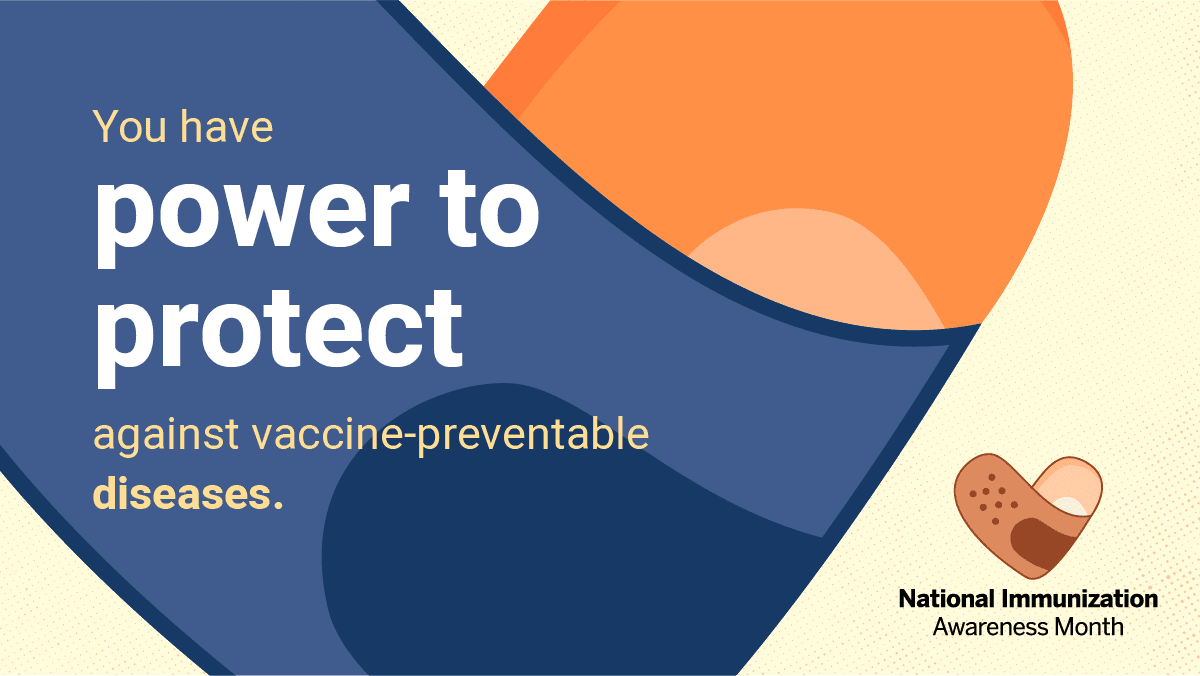 August is National Immunization Awareness Month. The annual observance highlights the importance of getting recommended vaccines throughout life. It emphasizes that vaccines aren’t just for kids; adults need to get vaccinated, too. Its timing, though, is an especially helpful reminder for students and their parents as back-to-school time nears. All 50 U.S. states require some form of school-entry vaccination (from pre-K to primary and secondary school kids as well as students at colleges and universities), but it has been the exemptions to these laws garnering more media attention this year. As vehement anti-vax rhetoric continues to cast doubt on the well-settled issue of vaccine safety and efficacy, it’s important we all do our part to thoughtfully counter misinformation.
August is National Immunization Awareness Month. The annual observance highlights the importance of getting recommended vaccines throughout life. It emphasizes that vaccines aren’t just for kids; adults need to get vaccinated, too. Its timing, though, is an especially helpful reminder for students and their parents as back-to-school time nears. All 50 U.S. states require some form of school-entry vaccination (from pre-K to primary and secondary school kids as well as students at colleges and universities), but it has been the exemptions to these laws garnering more media attention this year. As vehement anti-vax rhetoric continues to cast doubt on the well-settled issue of vaccine safety and efficacy, it’s important we all do our part to thoughtfully counter misinformation.
For me, that starts with educating myself—both about vaccines and why there seems to be a growing movement against them. While I’m no full-blown expert on either, I can tell you that pockets of unvaccinated and under-vaccinated subgroups persist due largely to not only misinformation, but also fear, distrust, and/or frustration. I remember vividly a social media encounter with an acquaintance who posted some nonsense video about the U.S. Food and Drug Administration (FDA) hiding safety information before approving some vaccine. The video strung together soundbites from an advisory committee meeting where some committee members raised legitimate concerns about the vaccine, but it did not provide the full context for the discussion. Intrigued, I found the entire playback of that FDA advisory committee meeting and listened to it. I then posted a comment to this acquaintance respectfully disagreeing with her and the video’s characterization of the committee’s deliberations. I calmly and matter-of-factly explained the digging I had done and how the video mischaracterized and took out of context many of the soundbites from the committee’s discussion. We had a very interesting (and infuriating!) back and forth about the safety of vaccines generally, and she shared that two of her children had been negatively impacted by vaccines they received. We didn’t get into the details of how they were hurt, but it was clear from our continued discussion that she flat out did not believe her concerns had been heard or adequately addressed by her children’s healthcare provider or the larger health and political system. While this is pure conjecture on my part, my guess is that she, much like the new mom in this NPR Hidden Brain podcast episode on false beliefs, was “welcomed … with open arms” into an anti-vax Facebook group where “everyone was caring and attentive.” She likely connected with them as they validated her fears for her children’s safety and frustrations with a system that wasn’t listening to her. That connection likely led to trusting them and the misinformation they shared with her.
Trust and human connection are vital tools that health practitioners, public health policymakers, scientists, and other experts must learn to wield in our efforts to ensure herd immunity (i.e. that enough people are vaccinated to stop transmission of the disease). Without them, people will continue to turn to other sources that fill those basic human instincts. As a mentor of mine once shared with me during a contentious tobacco control policy campaign and the Hidden Brain podcast episode title makes clear, facts aren’t enough. The fact that the worst U.S. measles outbreak in nearly three decades rages on with almost 1,175 cases confirmed in 30 states isn’t enough. The fact that 75% of cases have been linked to outbreaks in New York (New York City and Rockland County) among unvaccinated community groups isn’t enough. The fact that vaccines are safe and don’t cause autism isn’t enough. The fact that the number of measles cases this year in New York alone have set a new record for the country; there are ongoing outbreaks in Washington, California, and Texas adding to the toll; and all of these facts combined threaten to undo the public health accomplishment achieved in 2000 of eliminating measles from the U.S. are not enough. And the fact that you and I are frustrated that others don’t see this isn’t enough. Luckily, health officials are getting creative and trying new strategies to reach vulnerable populations, including training health practitioners on cultivating trust to respectfully and effectively address the anti-vax fears and myths of their patients.
In the meantime, you and I can do our part by making sure our own immunity, and that of our kids, are up-to-date by checking out the U.S. Centers for Disease Control and Prevention’s (CDC) Interactive Vaccine Guide. In three short pages, it provides a list of recommended vaccines from pregnancy to a child’s early and teen years as well as into adulthood. If you’re feeling especially called to do more, consider thoughtfully engaging with those whom you have a relationship if anti-vax sentiments are shared (to the extent you have energy and feel safe) or maybe even being a part of the science underpinning the development of safe and effective vaccines. In my next blog, I’ll describe my own experience participating in this vaccine clinical trial that is still recruiting volunteers. Hopefully it’ll inspire you to be part of advancing the public’s health.
* Image courtesy of CDC



